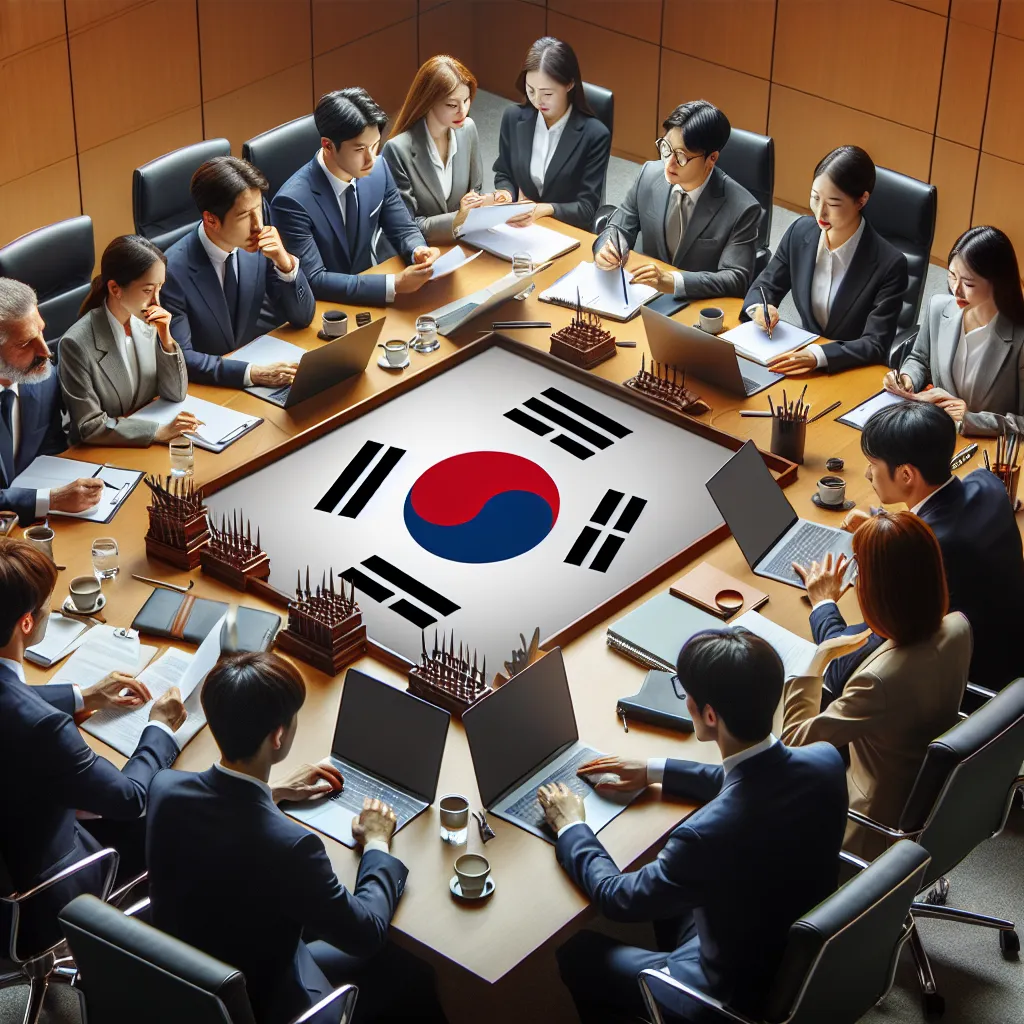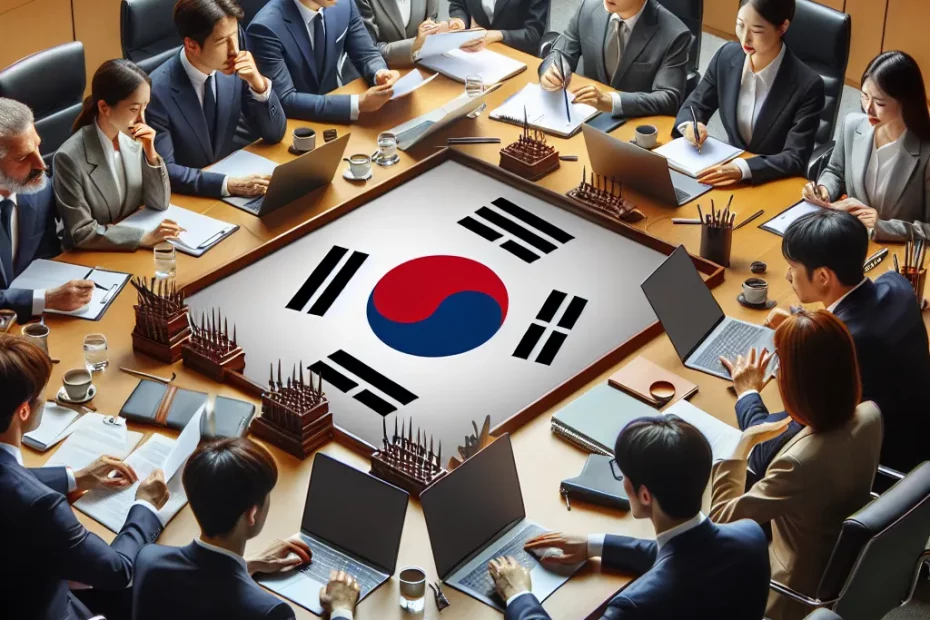As you navigate the complex landscape of international business, it’s crucial to understand the legal considerations when dealing with contracts involving Korean companies. From contract law nuances to compliance regulations, there are various aspects to keep in mind to ensure smooth business transactions. Let’s delve into the key points that can help you navigate the intricacies of handling business contracts with Korean companies. Understanding these factors will not only protect your interests but also foster strong and successful business relationships in the Korean market. Let’s explore the legal considerations and strategies that can make your business dealings in Korea a success!

Understanding Contract Law in Korea
Hey there! Today, let’s dive into the fascinating world of contract law in Korea. Understanding the legal considerations when dealing with business contracts in Korea is crucial for a successful partnership. So, let’s explore some key points together!
The Korean Civil Code
In Korea, contracts are governed by the Korean Civil Code. This code outlines the basic principles of contract formation, validity, and enforcement. One important aspect to note is that contracts in Korea can be either written or oral. However, for clarity and evidentiary purposes, it is always recommended to have written contracts in place.
Principle of Good Faith
When entering into a contract with a Korean company, it’s essential to consider the concept of good faith. In Korean contract law, the principle of good faith plays a significant role in interpreting and enforcing contracts. This means that parties are expected to act honestly and fairly in their dealings, and any violation of this principle can lead to legal consequences.
Language Considerations
Another crucial point to keep in mind is the importance of understanding the language of the contract. In Korea, contracts are typically written in Korean, and any translation discrepancies can lead to misunderstandings or disputes. It’s advisable to have contracts translated by a professional translator to ensure accuracy and clarity.
Remedies for Breach of Contract
Now, let’s talk about the remedies available in case of a breach of contract in Korea. The Korean legal system provides various remedies, including damages, specific performance, and cancellation of the contract. The specific remedy available will depend on the nature of the breach and the terms of the contract.
In conclusion, navigating the waters of contract law in Korea requires a good understanding of the legal framework, cultural nuances, and language considerations. By being aware of these key points, you can ensure smooth and successful business dealings with Korean companies. Remember, when in doubt, always consult with legal experts to guide you through the process!
Hope this overview gives you a better grasp of the legal considerations when handling business contracts with Korean companies. If you have any questions or need further clarification, feel free to reach out. Cheers to successful partnerships in Korea! 🌟📝
Key Differences in Contracting with Korean Companies
Cultural Context
In Korea, relationships are highly valued, and business dealings are often influenced by personal connections. Building trust and rapport with your Korean counterparts is essential for successful contract negotiations.
Legal Framework
Korean contract law is based on the Civil Code, and there are specific regulations that govern different types of contracts. It’s important to be familiar with these legal requirements to ensure your contracts are enforceable in Korean courts.
Language Barrier
While English is widely used in international business, it’s crucial to have contracts translated into Korean to avoid any misunderstandings or misinterpretations. Legal terms and nuances can vary between languages, so clarity is key.
Negotiation Style
Korean business culture values harmony and consensus-building. Negotiations may take longer as parties strive to find mutually beneficial solutions. Patience and flexibility are essential traits when dealing with Korean companies.
Confidentiality and Non-Disclosure
Protecting sensitive information is paramount in business agreements. Korean companies place a high value on confidentiality, so including robust confidentiality clauses in your contracts is vital.
Payment Terms
Payment schedules and methods may differ in Korea compared to Western countries. Understanding the local payment customs and ensuring clear payment terms in your contracts can help avoid any payment delays or disputes.
Technology and Communication
Korea is known for its advanced technology infrastructure, so digital communication and electronic signatures are widely accepted. Embracing digital solutions can streamline contract processes with Korean companies.
By being aware of these key differences and adapting your contracting approach accordingly, you can navigate the complexities of doing business with Korean companies more effectively. Remember, building strong relationships and understanding the cultural nuances are essential for successful business partnerships in Korea!
Ensuring Compliance with Korean Contract Regulations
When it comes to handling business contracts with Korean companies, it is crucial to ensure compliance with Korean contract regulations. Understanding and adhering to these regulations is essential for the successful execution of contracts and maintaining a positive relationship with Korean partners. Let’s delve into some key considerations to keep in mind:
1. Legal Framework
Korean contract law is primarily governed by the Korean Civil Code. It is essential to familiarize yourself with the legal framework to ensure that your contracts are in line with the requirements set forth by Korean law.
2. Specificity in Contracts
Korean contracts often require a high level of specificity. It is important to clearly outline all terms and conditions, including payment terms, delivery schedules, and any other relevant details. Ambiguity in contracts can lead to misunderstandings and disputes down the line.
3. Cultural Sensitivity
Understanding Korean business culture is crucial when drafting contracts. Politeness, respect for hierarchy, and indirect communication are important aspects to consider. Being culturally sensitive in your contracts can help build trust and rapport with your Korean counterparts.
4. Translation Accuracy
If your contracts are in a language other than Korean, it is essential to ensure accurate translation. Misinterpretation of terms or clauses due to translation errors can have serious consequences. Working with professional translators or legal experts can help avoid misunderstandings.
5. Dispute Resolution Mechanisms
Including clear dispute resolution mechanisms in your contracts is vital. In Korea, alternative dispute resolution methods such as arbitration are commonly used. Having these mechanisms in place can help resolve conflicts efficiently and avoid lengthy legal battles.
6. Compliance with Regulatory Requirements
Korean contracts may be subject to specific regulatory requirements depending on the industry or nature of the agreement. Ensuring compliance with these regulations is essential to avoid legal issues or penalties.
By paying attention to these key considerations and ensuring compliance with Korean contract regulations, you can navigate the intricacies of doing business with Korean companies successfully. Remember, building strong relationships based on trust and mutual understanding is the foundation of successful business partnerships in Korea! 🤝🇰🇷
Strategies for Resolving Contract Disputes in Korea
When it comes to handling business contracts with Korean companies, it’s crucial to be aware of the legal considerations to ensure smooth transactions. However, disputes can still arise despite careful planning and execution. In such cases, knowing the strategies for resolving contract disputes in Korea is essential for a successful outcome! 🤝
Effective Communication and Negotiation
One effective strategy is to first attempt to resolve the dispute through negotiation and communication. Open and honest discussions can often lead to mutually beneficial solutions. 🗣️ If direct negotiation proves challenging, engaging in mediation or arbitration can be a viable alternative. These methods provide a neutral ground for parties to present their cases and reach a resolution with the help of a third party. ⚖️
Legal Review and Advice
Another important strategy is to thoroughly review the contract terms and seek legal advice from professionals well-versed in Korean contract law. Understanding the legal implications and obligations outlined in the contract is crucial for making informed decisions during dispute resolution. 📝 Legal experts can provide valuable insights and guidance on the best course of action to take.
Litigation as a Last Resort
In some cases, it may be necessary to consider litigation as a last resort. While this can be a lengthy and costly process, it may be the only option for resolving complex disputes that cannot be settled through negotiation or alternative methods. 🏛️ Prior to pursuing litigation, conducting a risk assessment and weighing the potential outcomes is advisable to make an informed decision.
Professional Conduct
Maintaining a professional and respectful demeanor throughout the dispute resolution process is key to preserving relationships and reputation. Emotions can run high during disputes, but approaching the situation with a level head and a focus on finding a fair resolution is paramount. 💼 By demonstrating a willingness to cooperate and find common ground, parties can increase the likelihood of reaching a satisfactory agreement.
Overall, having a clear understanding of the strategies for resolving contract disputes in Korea and being prepared to navigate the process with diligence and professionalism is essential for successful conflict resolution. By employing these strategies and seeking appropriate guidance, businesses can effectively manage and overcome contract disputes, ensuring continued success in their dealings with Korean companies. 🌟
As you navigate the complex landscape of business contracts with Korean companies, it’s crucial to understand the legal considerations and nuances involved. From grasping the intricacies of contract law in Korea to recognizing the key differences in contracting with Korean companies, staying informed is key. Ensuring compliance with Korean contract regulations and having strategies in place for resolving disputes are essential steps in safeguarding your business interests. By being proactive, seeking legal advice when needed, and maintaining open communication with your Korean counterparts, you can navigate the challenges and opportunities that come with conducting business in Korea. Remember, a well-informed and proactive approach will not only protect your interests but also foster stronger and more successful business relationships in the long run.
